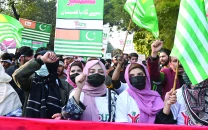Abdul Hafeez defends fiscal policy
PM's aide admits govt could not do well on privatising state-owned enterprises, pension reforms

De facto Finance Minister Dr Abdul Hafeez Shaikh admits govt could not do well on privatising state-owned enterprises, pension reforms. PHOTO: AFP/FILE
The government increased the defence budget proportionate to increase in inflation and civilian expenditures were cut by 20% due to fiscal constraints, Shaikh said, while addressing a conference through video link.
He said that the subsidies are also proposed to be reduced by Rs100 billion in the next budget.
The event had been organised by Corporate Pakistan Group – a platform of influential Pakistani professionals.
Pakistan’s two former finance ministers, Dr Miftah Ismail and Dr Shamshad Akhtar and Pakistan Business Council (PBC) Chief Executive Officer Ehsan Malik pointed out serious flaws in the proposed budget.
The unrealism of the proposed budget 2020-21 is a writing on the wall, as except Shaikh, almost every participant predicted a mini-budget.
“We have not done so well on privatisation, state-owned enterprises and pension reforms,” Shaikh said, while speaking on the occasion.
“The pension reforms is a big ticking timebomb and we have not done well,” he added, while highlighting the areas where the Pakistan Tehreek-e-Insaf (PTI) government could not do well.
Shaikh noted that the outbreak of the deadly pandemic impacted the government’s privatisation programme.
“There is also a need to improve coordination with the provinces and the government could not strengthen the regulators like the CCP,” he maintained.
Pakistan’s loss-making enterprises are causing massive losses annually.
The power sector circular debt has almost doubled from Rs1.15 trillion to Rs2.1 trillion within two years of the PTI government.
The Pakistan Railways is heavily bleeding and in addition to annual regular payments from the budget, the PTI government also approved Rs6 billion supplementary grant to compensate some of the losses.
The Pakistan International Airlines is adding Rs6 billion a month to its losses and the Pakistan Steel Mills remained closed for the last five years.
Shaikh said the government tried to present a balanced budget in the given circumstances and added that the premier took a bold step and decided not to increase salaries of the employees.
Govt admits tax target unachievable
He once again repeated his allegations against the Pakistan Muslim League-Nawaz (PML-N) and stated that the PTI government had inherited a broken economy.
Dr Ismail challenged Shaikh’s assertions about poor economic performance of the PML-N saying that except for current account deficit, the Nawaz league did well on every front including revenue collection and economic growth rate.
“When we left, the economy was growing at a rate of 5.5% and the tax collection almost doubled to Rs3.842 trillion within five years,” PML-N’s former finance minister said.
“There is no doubt that the current account deficit was 6% of GDP when we left the government but it was 8.2% of GDP when the PPP left,” he added.
“You have to be competent to collect taxes and despite claims of doubling the tax collection within first year, the FBR’s revenues are still at the level left behind the PML-N.”
Dr Ismail remarked that the exports remained stagnant during five years of the PML-N tenure but pointed out that despite 40% currency devaluation during first year of the PTI government, the exports were negative 2%.
While commenting on the proposed budget, he declared that the government would either have to bring a mini-budget or cut expenditures to achieve the proposed budget deficit target of 7% of GDP.
“In challenging times, the government should increase the PSDP up to Rs1.2 trillion and cut the GST rate by 2% to let the economy grow,” he said.
He suggested that there should be national dialogue to control the ballooning public debt.
“I wish budget should have been more imaginative.”
Dr Ismail pointed out that the PTI government had added almost Rs11 trillion in public debt in less than two years, which was equal to 35% of the total public debt accumulated in past 70 years.
Former caretaker finance minister Shamsahd Akhtar also expressed her views on the occasion.
“We do not really have corona budget,” she said.
She observed that health was given the least priority in the budget despite the fact that there was a health emergency in the country.
“The government has understated the expenditures and overstated the revenues,” she said, projecting that in the next fiscal year, the budget deficit would be over 9% of GDP as against the target of 7%.
She further noted that the FBR’s revenue collection may grow only 8 to 9% as against the government’s expectations of 27% growth in revenues in the next fiscal year.
Pakistan Business Council CEO Ehsan Malik was of the view that the budget had been made under the constraints of Covid-19 and strictures of IMF and that the international money lender had prevailed upon.
He declared that 27% proposed higher target for the FBR was unrealistic, fearing that the revenue board could harass the businessmen while chasing the mark.
“We expect that mini-budget will follow,” he said.



















COMMENTS
Comments are moderated and generally will be posted if they are on-topic and not abusive.
For more information, please see our Comments FAQ